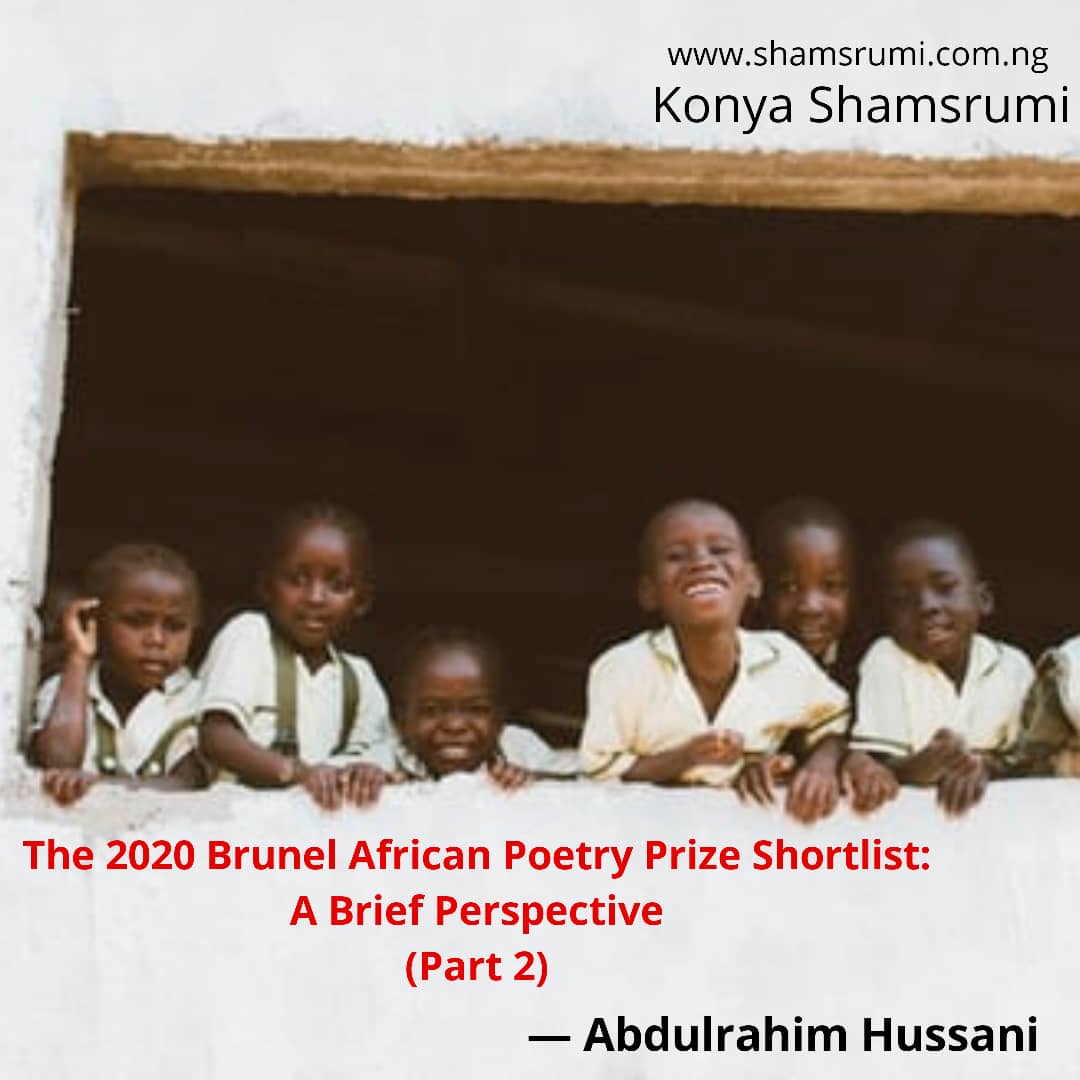As you read through this review, please note that the explanations and views given here are absolutely my articulated thoughts and personal perception of this year’s shortlist. This write-up is in no way influenced or linked to the views or intentions of Konya Shamsrumi, the establishers of the Brunel Poetry Prize or the shortlisted poets. For biographies of the shortlisted poets and their poems, please visit the prize website.

This second part of my perspective on this year’s Brunel International African Poetry prize shortlist contains the poets whose poems are chaotic in a sort of way, yet, enigmatic in their use of language. I call them the ‘renegades’ on the shortlist.
Amanda Holiday (Sierra Leone)
If you are searching for a perfect storyteller on the shortlist, look no further than Amanda Holiday.
What Amanda lacks in aestheticism, she compensates with deftness and thematic approach in her entries. They might look ordinary at first glance but, on a closer examination, you are confronted with hidden messages. This is brilliance. For example, in the poem A whiff of something, Amanda presents us with a certain fallout of the Rwandan genocide. How horrible experiences can cause a lifetime of haunting memories. The following lines explain it better:
The journalist tells them how, when he returned from Rwanda, he had the smell of death in his nose. He tries to get the smell out of his nose every morning; he rinses his nostrils out with soap,...
Dear Miss Lonelyhearts speaks about racial affairs. How it is an unending issue that never goes away. Poems like The Temptation of Saint Anthony; The Notes on James Ensor’s The Temptation of Saint Anthony, are trickier to decipher without prior grasp of certain elements in the poems.
In African Icarus, we are confronted with another astonishing tale. Here, a yearning for greener pastures leads our bold but foolhardy persona to an early grave. I think this softer ground-seeking is what is still prevalent in Africa of today (well, before Covid-19 made its name) and rightly so, because so many things aren’t right about Africa at the moment. The poem depicts that people will do what it takes to smell the air of Europe, America and even Asia.
Black sunflowers is not merely a poem about flowers, I suspect. There is an underlying Africanness to it that hits the nostrils strong. Notes for a chronology of smell is actually a chronology of smell….
All in all, Amanda Holiday has added flavour to this year’s shortlist. She’s thematically strong (in an abstract sense) and her approach is good as well. In particular, African Icarus and A whiff of Something both stand out for me. They are what you find in the best of flash fictions. A single Kodak shot unfurls a broader tale.
Nour Kamel (Egypt)
This is how Nour Kamel’s poems portray her: A carefree lady in a country under the rule of a tyrant who suddenly declares that everyone must wear blue on a Saturday morning to mourn the misfortune of his stillborn child. . . but our lady goes out donning the most crimson red dress in her possession. Why? Because she loves red and she wants to be free.
Nour’s poems are replete with valiant, but well-known themes like queerness, identity, femininity, gender bias and others. In Hypothetical body equation (with cats), we see the persona’s frustration and yearning for freedom of being. Poems like the sparkling Her Sweater, the didactic Jonah and the whale, Other ways of saying, all tackle issues of gender, queerness and identity in one form or another.
Where Nour Kamel reaches a crescendo in creativity, or rather, stamps her authority on this shortlist, is with/in the poem Punnet square for the greenest eye where mathematics romances genetics. It’s a poem bordering on gender oppression. The birth of a female child is usually met with unhappiness and an agony more felt by the woman, while the menfolk express displeasure. But then genetics tells us it is the man’s genes that determine the sex of the child. Then whose fault is it if not his? This is Nour’s brilliant song of protest. Lines from the poem go thus:
The soft dimple on your chin would be stronger with a Y but he didn’t give you one, gave you a weak chin and an inny crotch instead. Who mourns this more. You, or him who gives you a boy’s name...
One other sublime poem of protest that shouldn’t go unnoticed is Entropy change in a classroom.
In a sweeping gaze, there is a feel of Momtaza Mehri in Nour’s poems. Although these poems often seem unnecessarily wordy, I want to believe that it is, perhaps, the only way that this poet can tick and drive home her points effectively. Nour is a front runner for the prize.
Saradha Soobrayen (Mauritius)
This is how Saradha Soobrayen’s poems portray her: A woman who is eager to voice her mother tongue to everyone regardless of whether they belong or not. She’s proud of her heritage and is saying, “Look here, my language is finer than yours.” She wants to name everything in her tongue.
The major themes in Soobrayen’s poems are heritage, conservatism and, well, language. Her poems are replete with expressions served in her indigenous language. This fusion of English and the traditional is what sets Soobrayen apart from the rest and is the bane for her place in the shortlist.
But then, this seemingly too much “over-dependence” on a foreign language, considering the fact that this is a contest for poems in English, makes her poems too torrid and difficult to enjoy. Yes, enjoyment is key. And this wrinkle is what I feel weakens her stronghold in this contest and poses forth questions that have been well touched on from time immemorial about African writing. What language should we employ in writing as Africans? Should we stick to our indigenous ones which confirms loyalty but breeds misunderstanding and inaccessibility by those not of us or cash in on a universal language which is better understood and relatable but weakens our heritage and rubs away the rawness of our tongues? This dilemma will always remain. But an attempt to fuse both is what announces Soobrayen’s brilliance and originality.
VERDICT
I don’t feel that this year’s shortlist is a stiff one nor that there is one among the shortlisted poets who outrightly tower shoulder-high above the rest. But then, I see it as a three-horse race. I am tempted to mention names which I’ve decided against that. Still, if you look carefully from the first part of this write-up, you’ll decipher them for yourself.
Judging by how previous years of the prize have panned out, I’m not ruling out a tie.
However, no matter who wins, I believe this is certainly not the last we’ll see of these poets. Cheers to another healthy dose of poetry from the Brunel! May the best win!
Hussani Abdulrahim is a graduate of Pure Chemistry from Usmanu DanFodio University, Sokoto, Nigeria. He has received several recognitions for his writings, including, 2019 Poetically Written Prose Contest (winner), Boston Review’s Aura Estrada 2019 Short Story Contest (finalist), 2019 Awele Creative Trust Short Story Contest (shortlist), WRR Green Author Prize 2016 (joint-winner), 2018 Africa Book Club short story contest (finalist), Nigerian Students Poetry Prize 2019 (shortlisted), Ken Egas Poetry Prize 2018 (shortlisted), Eriata Oribhabor Poetry Prize 2019 (shortlisted) , Wordiators Championship 2018 first runner-up, 2018 ANA Kano/Peace Panel Poetry Prize (winner)… His works are forthcoming or have appeared at Boston Review, the art-musefair, praxismagonline, BPPC anthologies and several others. He resides in Kaduna and is currently working on a poetry chapbook and a collection of short stories. He believes that words have the power to heal the world of its numerous ills.












1 Comment